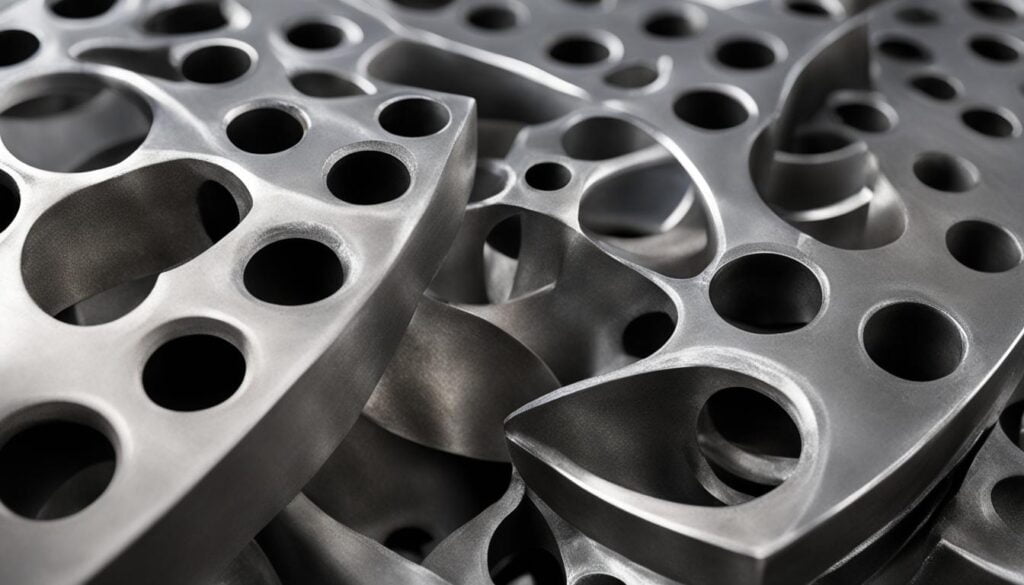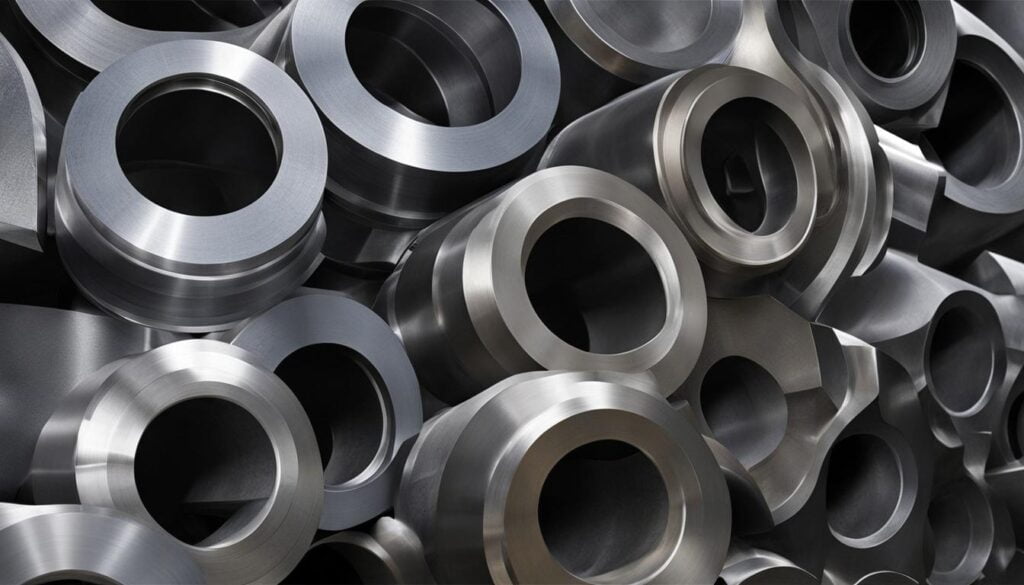Discover the numerous benefits and increased performance offered by alloy steel castings through design flexibility, economic efficiency, and robust engineering reliability. The versatility and adaptability of alloy steel castings allow for unparalleled customization in various industries, including automotive, aerospace, and oil and gas, justifying the question, “why use alloy steel castings?” By learning the advantages of alloy steel castings for diverse applications, you can confidently employ these materials to maximize efficiency and productivity. Discover custom solutions by industry leading foundries like KT-Foundry as we explore the world of alloy steel castings.
Key Takeaways
- Alloy steel castings provide design flexibility, enabling the creation of complex shapes and structures.
- Economic efficiency in production contributes to overall cost savings and improved performance.
- Enhanced engineering reliability ensures alloy steel castings perform well under various operational loads and environmental conditions.
- Metallurgical versatility and adaptability allow for countless customizations in chemical compositions and mechanical properties.
- Improved strength-to-weight ratio makes alloy steel castings ideal for industries such as automotive and aerospace.
Introduction to Alloy Steel Castings
Alloy steel castings are specialized materials created by combining metals to deliver superior properties over pure metals, such as increased strength, corrosion resistance, and economic benefits. Used throughout history, with the Bronze and Iron Ages marking significant periods of alloy use, these materials are now essential in numerous industries, allowing for a range of applications and fulfilling various mechanical requirements.
Steel is typically categorized into four main groups: carbon steels, alloy steels, stainless steels, and tool steels. Alloy steel castings constitute a unique category, as they provide the ability to incorporate different alloying elements, resulting in a wide array of chemical compositions and physical properties that suit a plethora of applications. This versatility is one of the main driving forces behind the growing demand for alloy steel castings in various sectors.
| Industry | Alloy Steel Casting Applications |
|---|---|
| Automotive | Gear components, engine blocks, connecting rods, steering knuckles |
| Aerospace | Turbine blades, engine casings, structural components |
| Oil and Gas | Valves, casings, pumps, wellhead components |
| Construction | Earthmoving equipment, structural supports, wear plates |
| Marine | Propellers, rudders, shafts, underwater components |
Moreover, advancements in casting technologies have contributed to the continuous expansion of alloy steel casting applications. The production processes have evolved over the years, providing manufacturers with more cost-effective and efficient methods that meet the ever-growing demand for high-performance and reliable castings.
“The Bronze and Iron Ages marked significant periods of alloy use, paving the way for the vital role alloy steel castings play in modern industries.”
Investigating the various aspects of alloy steel castings – from their history and production methodologies to their unique properties – will help us appreciate their significance in different sectors and understand why they have become the material of choice for countless applications.
- History of Alloy Steel Castings
- Types of Alloy Steel Castings
- Production Methods
- Metallurgical Properties
- Applications and Industries
In conclusion, the Introduction to Alloy Steel Castings offers a comprehensive Alloy Steel Casting Overview, highlighting the key aspects that have led to its position as a go-to material in many industries. By understanding What is Alloy Steel Casting and how it has evolved throughout history, we can better appreciate its unique properties and numerous applications that continue to shape our world.
Design Flexibility of Alloy Steel Castings
Alloy steel castings provide a high degree of design flexibility, allowing for the creation of intricate, complex shapes and configurations. This flexibility stems from the unique properties inherent in alloy steel, which enable the material to be easily manipulated and crafted into distinct, customized forms.
One key aspect of design flexibility is the ability to produce complex shapes, even hollow section parts, while maintaining structural integrity and repeatability. This ensures that each cast is both sturdy and consistent, ensuring optimal performance and reduced production lead times.
Complex Shapes and Structures
Alloy steel castings are well-suited for the production of complex shapes and structures. The material’s moldable nature enables intricate geometries and detailed features to be cast with precision, resulting in parts that are both visually striking and mechanically sound. This capability is particularly valuable in industries that require customized components built to withstand specific operational demands or mitigate challenging environmental conditions.
Alloy steel castings offer maximum design freedom, facilitating the creation of intricate, intricate designs that remain sturdy and repeatable.
By offering rapid alterations in design, alloy steel castings help to significantly reduce delivery times. Such flexibility ensures that manufacturers can quickly adapt their processes to cater to changing industry trends, regulatory requirements, or client preferences. The result is versatile solutions that efficiently serve an array of intricate and challenging structural requirements.
- **Design Flexibility** – Alloy steel castings allow for the creation of intricate shapes, providing manufacturers with greater design freedom.
- **Complex Shapes Casting** – The material’s moldable nature enables the production of detailed designs with accuracy and repeatability.
- **Alloy Steel Configurations** – Industry applications benefit from the ability to produce customized components tailored to operational requirements and environmental conditions.
In conclusion, alloy steel castings are an ideal choice for manufacturing projects that demand both design flexibility and complex shapes casting. The resulting alloy steel configurations meet the precise, demanding needs associated with various industries and applications.
Economic Efficiency in Production
The economic benefits of castings are a driving factor for choosing alloy steel in various industrial applications. Their isotropic nature results in consistent strength and reliability, ultimately contributing to the cost-effectiveness experienced across the production chain. When considering design flexibility and reduced production times, it becomes clear why these castings offer a more efficient and budget-conscious solution.
To further understand the economic prowess in production of alloy steel castings, it is important to explore its key advantages:
- Design Flexibility
- Shorter Production Timelines
- Minimal Post-Casting Machining or Welding
Alloy steel castings deliver a perfect balance between budget and performance, with countless economic benefits attributed to their manufacture and use.
Alloy steel castings provide greater design flexibility, allowing for the creation of complex shapes and structures without compromising on durability or strength. This results in a more efficient production process and reduced material waste, ultimately leading to cost savings for manufacturers and clients alike.
Shorter production timelines, due in part to the streamlined manufacturing process, ensure projects can be completed at a faster pace. Rapid delivery of components is especially important for industries requiring tight project schedules and reliable outputs, making alloy steel castings an ideal choice.
With minimal need for post-casting machining or welding, further savings are generated. Utilizing alloy steel castings diminishes the occurrence of additional post-production steps, decreasing labor hours and material costs, while simultaneously enhancing production efficiency.
| Advantage | Impact on Costs and Efficiency |
|---|---|
| Design Flexibility | Reduced material waste and efficient production process |
| Shorter Production Timelines | Faster project completion and rapid component delivery |
| Minimal Post-Casting Machining or Welding | Decreased labor hours and material costs |
In conclusion, the economic benefits provided by alloy steel castings make them a top choice across numerous industries. Manufacturers seeking cost-effective steel castings with maximized production efficiency stand to gain much from alloy steel’s inherent advantages.
Enhanced Engineering Reliability
Alloy steel castings are known for their isotropic nature, which significantly contributes to their reliability as dependable engineering materials. Their isotropic properties ensure consistent performance, making isotropic steel castings an ideal choice for applications that demand reliable operation across various loads and environmental conditions. As such, dependable alloy castings have become an essential component in modern engineering.

Some key factors that contribute to the engineering reliability of alloy steel castings include:
- Uniform mechanical properties throughout the material
- High resistance to fatigue and wear
- Enhanced corrosion resistance
- Ability to withstand extreme temperature and pressure conditions
These characteristics make alloy steel castings an ideal choice for critical applications across various industries such as aerospace, automotive, defense, marine, and energy.
Isotropic steel castings are particularly well-suited for applications where consistency and uniformity of material attributes are vital. An excellent example of this is gears and shafts used in heavy machinery, where any inconsistencies could lead to catastrophic failures and expensive downtime.
| Industry | Typical Applications |
|---|---|
| Aerospace | Turbine components, engine casings, landing gear components |
| Automotive | Transmission components, differentials, engine blocks |
| Defense | Weapon systems, armor components, tracked vehicle components |
| Marine | Propellers, valves, engine components |
| Energy | Turbine casings, coupling components, pump casings |
By offering consistent performance in a wide range of challenging environments, alloy steel castings have clearly earned their place as reliable engineering materials across numerous industries. Leveraging their isotropic properties, dependable alloy castings continue to expand the boundaries of what is possible in modern mechanical engineering.
Metallurgical Versatility and Adaptability
Alloy steel castings exhibit exceptional metallurgical versatility due to their ability to incorporate various chemical compositions and heat treatments that cater to specific project requirements. This adaptability affords a wide array of physical and mechanical properties, customized to optimize performance in targeted applications.
Customizable Chemical Compositions
Alloy steel castings enable the selection and combination of several chemical components, yielding unique alloys with attributes tailored to meet the demands of diverse industries. For example, the automotive industry may require increased tensile strength for structural components, while the aerospace industry necessitates a balance of strength and weight for optimal fuel efficiency. Thus, a customized alloy composition becomes essential.
Incorporating different alloying elements allows us to create bespoke metallurgical solutions that cater to the evolving needs of industries worldwide, ensuring high-quality performance and tailored functionality.
Variety in Mechanical Properties
Alloy steel castings possess a broad spectrum of mechanical properties, achieved by varying the alloying elements and heat treatment processes. Properties can range from enhanced durability to increased corrosion resistance, depending on the application requirements. Furthermore, the heat treatment process can also alter the hardness, toughness, and ductility of the material, ensuring that it performs optimally in its intended use.
| Industry | Required Mechanical Property | Alloying Element |
|---|---|---|
| Automotive | Tensile Strength | Chromium |
| Aerospace | Strength-to-Weight Ratio | Titanium |
| Oil & Gas | Corrosion Resistance | Nickel |
| Marine | High Fatigue Resistance | Molybdenum |
In conclusion, metallurgical versatility and adaptable alloy compositions sit at the heart of alloy steel castings, engendering a remarkable range of mechanical properties customized to suit a diverse array of applications and industries. By leveraging this flexibility, we can deliver exceptional performance to suit the specific requirements of each project.
The Value of Streamlined Manufacturing
Streamlined casting manufacturing is an essential feature of alloy steel castings, greatly contributing to the efficiency of alloy production. By repeatedly creating complex and refined shapes using molds, companies can ensure high-quality casts throughout each production cycle. This consistent approach not only saves time but also reduces costs, making streamlined manufacturing a significant advantage in the realm of alloy steel castings.
Three key factors underscore the importance of a streamlined manufacturing process:
- Enhanced design capabilities: The ability to create intricate shapes and components without sacrificing strength or performance encourages the exploration of innovative design solutions.
- Reduced production lead times: Streamlined processes minimize time-consuming steps, offering quicker delivery of finished products.
- Maximization of cost-efficiency: Rapid production cycles and lower material waste contribute to decreased operational expenses and a better return on investment.
Streamlined manufacturing processes are intrinsic to the success of alloy steel castings, yielding a consistent production of high-quality components while saving valuable time and resources.
As a result, businesses that require alloy steel castings for their operations should prioritize streamlined manufacturing methods. By doing so, they can ensure a cost-effective and efficient alloy production process that yields consistently high-quality components, meeting the strict requirements of even the most demanding applications.
The Significance of Corrosion Resistance
Corrosion resistance is a key advantage of alloy steel castings, where alloys are engineered to withstand environmental challenges better than pure metals. This property extends the lifespan and maintains the integrity of components used in demanding conditions, thus offering greater durability and lower lifecycle costs.
The importance of corrosion resistant alloys cannot be overstated, particularly in industries exposed to harsh environments such as marine, oil and gas, and chemical processing. In these industries, material performance and longevity are critical to operation success and cost management.
To further illustrate the value of durable alloy steel castings in various industries, we have outlined key examples of their corrosion resistance capabilities.
- Marine Applications: For marine and subsea environments, corrosion resistance is essential due to exposure to salt water, which accelerates corrosion processes. Alloy steel castings offer excellent resistance to these corrosive agents, allowing for longer component life and reduced maintenance and replacement costs.
- Oil and Gas: The oil and gas industry operates in extreme conditions that demand corrosion-resistant materials. From offshore drilling platforms to refineries and pipelines, alloy steel castings are widely used because they can withstand exposure to corrosive fluids and gaseous environments, ensuring operational reliability.
- Chemical Processing: In chemical processing plants, corrosive chemicals and elevated temperatures pose significant challenges to equipment and components. Highly corrosion resistant alloys provide necessary protection against these destructive forces, ensuring safe and efficient operations.
Advancements in materials engineering have led to the development of a diverse range of corrosion-resistant alloys tailored to meet specific industry needs. Various alloying elements can be added to steel, creating alloys with different levels of corrosion resistance, strength, and durability.
The right combination of properties in corrosion-resistant alloys empowers industries to thrive in demanding environments, offering superior performance and cost-effective operation.
Quality durable alloy steel castings that provide reliable corrosion resistance prove indispensable, particularly as operating conditions continue to evolve. As a result, industries that value corrosion-resistant components benefit from improved performance and extended service life, contributing to a more sustainable and successful operation.
Improved Strength-to-Weight Ratio
Alloy steel castings have an improved strength-to-weight ratio, making them ideal for use in the automotive and aerospace industries, where such properties are essential for performance and fuel efficiency. These industries benefit from lighter-weight components without compromising strength or durability.
Benefits for the Automotive and Aerospace Industries
Both automotive and aerospace industries place a high premium on materials that can offer an optimal balance between strength and weight. The utilization of lightweight steel castings results in many advantages, including:
- Improved fuel efficiency
- Better vehicle performance
- Reduced emissions
- Easier handling and maneuverability
- Increased component lifespan

Additionally, these high-performance alloys facilitate innovative and complex design solutions, enabling manufacturers to create pioneering vehicles and aircraft that can tackle demanding engineering challenges head on, all while maintaining the integrity of the structure.
Alloy steel castings bridge the gap between the need for strong, durable components, and the demand for lightweight materials that do not compromise performance or efficiency in modern transportation industries.
Here is a comparison of common automotive and aerospace alloy properties:
| Alloy | Strength-to-Weight Ratio | Typical Applications |
|---|---|---|
| Aluminum Alloy (A356-T6) | 11.8 | Wheels, suspension components, aircraft structures |
| Magnesium Alloy (ZC62-T6) | 23.7 | Chassis parts, seat frames, gearbox housings |
| Titanium Alloy (Ti-6Al-4V) | 26.4 | Engine components, exhaust systems, landing gear |
As demonstrated in the table, different alloys offer varying strength-to-weight ratios suitable for a range of applications. These materials demonstrate the versatility and adaptability of alloy steel castings in meeting the ever-evolving demands of the automotive and aerospace industries.
Superior Physical and Mechanical Properties
Alloy steel castings boast superior alloy qualities and exceptional mechanical properties that set them apart from pure metals. Their unique characteristics stem from variations in carbon content, alloying elements, and heat treatment processes, which contribute to increased hardness, durability, and strength. These attributes make alloy steel castings particularly well-suited for industrial applications that demand specific material characteristics.
Heat treatment is essential for achieving a wide range of exceptional mechanical properties in alloy steel castings. Various methods, including annealing, quenching, and tempering, can be utilized to refine grain structure, enhance hardness, and increase material strength.
Alloy steel castings outshine pure metals in terms of superior physical and mechanical properties, making them the optimal choice for a diverse array of industrial applications.
To delve deeper into the advantages of alloy steel castings, let’s compare their mechanical properties with those of pure metals.
| Material | Hardness (Brinell) | Yield Strength (MPa) | Tensile Strength (MPa) |
|---|---|---|---|
| Pure Iron (99.8%) | 110 | 80 | 210 |
| Carbon Steel (C1045) | 250 | 430 | 630 |
| Alloy Steel (AISI 4140) | 290 | 670 | 930 |
As shown in the table, alloy steel castings exhibit considerably higher levels of hardness, yield strength, and tensile strength than pure metals. The addition of alloying elements and tailored heat treatment processes contribute to the superior performance of alloy steel castings when compared to their pure metal counterparts.
In summary, the superior alloy qualities and exceptional mechanical properties of alloy steel castings elevate their importance in industrial applications. These exceptional characteristics facilitate the creation of reliable, durable, and high-performing components that outperform their pure metal counterparts.
Alloy Steel Castings in Industry Applications
Alloy steel castings play a crucial role across a wide array of industries, thanks to their versatility, durability, and contributions to enhanced performance. Industries such as oil and gas, automotive, and marine specifically benefit from the advantageous properties conferred by alloy steel castings.
Oil and Gas
In the oil and gas sector, the strength and corrosion resistance of alloy steel castings are highly appreciated for their ability to withstand the harsh and demanding conditions typically encountered in this field. The exceptional resilience of these materials enables the production of long-lasting, high-performance components tailored to the unique challenges posed by oil and gas operations.
Automotive Applications
The automotive industry greatly values alloy steel castings for their durability and lightweight characteristics. An improved strength-to-weight ratio allows for the development of sturdy yet lightweight vehicle components, which translates to better fuel efficiency and enhanced overall performance. In addition, the flexibility of alloy steel also enables the production of intricate, custom-designed components suited to various automotive requirements.
Marine and Subsea Applications
Marine and subsea applications rely heavily on materials that can resist the harsh conditions of underwater environments. Alloy steel castings provide the perfect combination of high strength and corrosion resistance, allowing for the production of critical components designed to endure the pressures and corrosive effects commonly faced in marine settings.
Alloy steel castings offer a versatile and adaptable solution for various industry applications, combining strength, corrosion resistance, and durability to deliver top-quality performance in even the most demanding environments.
- Oil and gas: Enhanced performance due to strength and corrosion resistance
- Automotive: Durability and lightweight components for improved efficiency
- Marine and subsea: Resistance to harsh environments and high strength
Custom Solutions by KT-Foundry
At KT-Foundry, we excel in producing customized alloy steel castings, tailored to meet the unique needs of our clients. With an extensive array of over 200 ferrous and non-ferrous alloys, our capabilities in custom alloy mixing and rigorous in-house testing procedures ensure that the final metallurgy meets the exact specifications our clients require.
Our precision alloy steel casting services deliver certified precision components with high integrity and tighter tolerances, providing value-engineered solutions that fit each project’s specific demands. This commitment to customization, quality, and adaptability is what sets our offerings apart from others in the industry and allows us to provide unbeatable solutions for our clients.
Offering an extensive array of over 200 ferrous and non-ferrous alloys, our capabilities in custom mixing and rigorous in-house testing procedures ensure the final metallurgy meets exact specifications.
The following table showcases some examples of our services and the industries they cater to:
| Service | Industry | Key Benefits |
|---|---|---|
| Precision Investment Casting | Aerospace | High precision, complex components with tight tolerances |
| Wear Resistant Casting | Mining and Heavy Equipment | Increased durability, reduced wear and tear |
| Heat Resistant Casting | Oil and Gas | Enhanced performance under high-temperature conditions |
As a leading provider of KT-Foundry custom alloy solutions, we understand the importance of providing our clients with the best possible outcomes so that they can remain competitive in their respective industries. By staying on top of advancements in technology and continuously innovating our processes, we are confident in our ability to consistently deliver the outstanding alloy products our clients have come to expect.
Conclusion
In summary, the numerous advantages of alloy steel castings make them an invaluable material in today’s manufacturing landscape. Their exceptional design flexibility, economic efficiency, and reliability contribute to their widespread use in various industries, such as automotive, aerospace, oil, and gas. By leveraging the metallurgical versatility and adaptability of alloy steel castings, clients are able to tailor components based on specific application requirements, enabling optimal performance and durability.
KT-Foundry, a leader in the field, specializes in offering custom alloy steel casting solutions to cater to the unique needs of clients across diverse industries. With our extensive array of over 200 ferrous and non-ferrous alloys, rigorous in-house testing procedures, and commitment to quality, customers receive value-engineered components with tight tolerances and high integrity, all while reducing costs and lead times.
As we move forward, alloy steel casting will continue to play a crucial role in the development of innovative manufacturing processes and products. By harnessing the countless benefits alloy steel castings offer, companies can remain at the forefront of their respective industries, pushing the boundaries of innovation and performance.
FAQ
What are the key advantages of using alloy steel castings?
Some of the main benefits of alloy steel castings include design flexibility, economic efficiency, enhanced engineering reliability, metallurgical versatility, streamlined manufacturing, corrosion resistance, improved strength-to-weight ratio, and superior physical and mechanical properties.
How does the design flexibility of alloy steel castings benefit manufacturers?
Alloy steel castings offer the ability to produce complex shapes and hollow section parts, allowing for maximum design freedom and rapid alterations. This significantly reduces delivery times and facilitates versatile solutions for intricate and challenging structural requirements.
What economic benefits do alloy steel castings provide?
Economic benefits of alloy steel castings include their isotropic material nature, contributing to consistent strength and reliability. The combination of design flexibility, shorter production timelines, and minimized need for post-casting machining or welding results in cost savings and economic prowess in production.
How do alloy steel castings enhance engineering reliability?
Alloy steel castings are reliable for day-to-day use due to their isotropic nature, making them a go-to choice for applications where dependable performance under various operational loads and environmental conditions is critical.
In which industries do alloy steel castings find applications?
Alloy steel castings are widely used in industries such as automotive, aerospace, oil and gas, and marine and subsea applications, due to their strength, durability, and corrosion resistance properties.
What role does KT-Foundry play in providing custom alloy steel casting solutions?
KT-Foundry specializes in producing customized alloy steel castings tailored to meet unique client needs. They offer an extensive array of over 200 ferrous and non-ferrous alloys, custom mixing capabilities, and rigorous in-house testing procedures to ensure the final metallurgy meets exact specifications, delivering certified precision components with high integrity and tighter tolerances.


